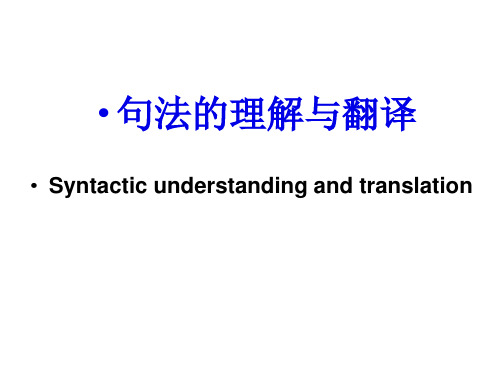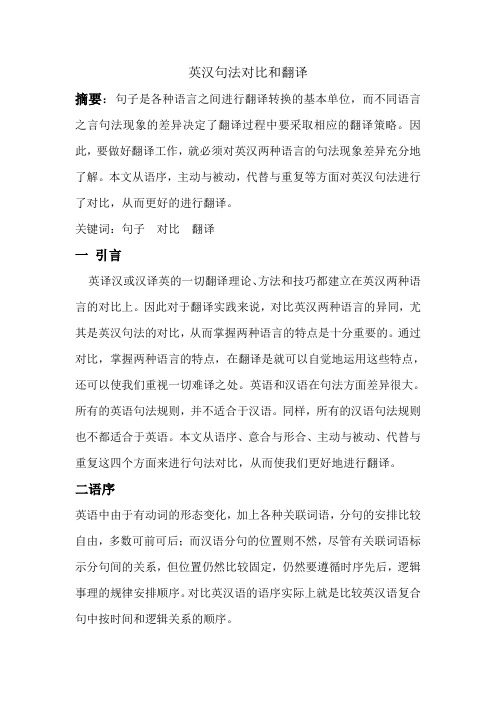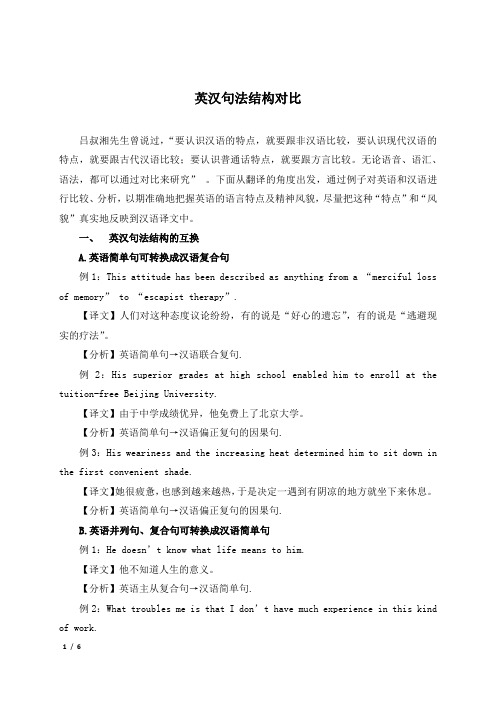(英汉句法对比)
英汉语法对比

(3)词法与句法之间的对应 英语传统语法分为词法和句法。词法依据形态;
句法依据功能。由于形态是功能的表现形式, 因此,这两者的结果是一致的,表现在词法和 句法可以对称,词类和句子成分之间有较明显 的对应关系。徐通锵将这样的语法称为双轨制 语法结构。
英语语法强调避免语法错误,句子结构紧凑,关 系和层次分明。
语句分析顺序,英语是从结构到语义。而汉语是 从语义到结构。
➢ 王冕七岁上死了父亲。
➢ 中国队大胜美国队/中国队大败美国队。
(2)语法单位的清晰与模糊
英语传统语法把语言单位分为词与句子两 级,在此基础上,把语法分为词法和句法, 结构主义语法把语言单位分为语素、词、 短语、分句、句子五级。在英语中,由于 有形态帮助,各级语法单位之间的界限是 清晰的。汉语则不然。
事理上的因果律:先因后果、先假设后可能、 先条件后结果。汉语复句基本上都是先从后 主,即表示原因、条件、假设等一律在前, 表示结果等一律在后。当把原因、条件等看 做补充说明时,根据心理上的重轻律,可以 把它们放在主句之后。
And he knew how ashamed he would have been if she had known his mother and the kind of place in which he was born, and the kind of people among whom he was born.
有形式上保证,英语短语和从句作修饰语 可前可后;主谓倒装、宾语前置都不会被 误解;据连词判断主从;据时态可判断时 间先后。形态丰富的语言不很讲究词序。
句中的作用。
汉语的声调对词和短语的语序起重要作用。
英汉句法(句子)对比与翻译

He became deaf at five after an attack of typhoid fever. (Typhoid Mary伤寒病患者[带菌者]; 传染病患者) 讨论:T-shaped road会不会 更忠实原文?
3. 老栓正在专心走路,忽然吃了一惊,远远地看见一条丁字街,明 明白白横着。他便退了几步,寻到一家关着门的铺子,蹩进檐下,靠 门停住了。(鲁迅《药》)
最好等明天再来谈罢。
The best thing would be for you to come again tomorrow.
有时可以考虑通过词类转换将动词转化为抽象名词或名 词化结构,并将其置于主语位置来重设主语:
C-E 一看到这条河,我便想起了我的故乡。
The sight of the river reminds me of my hometown. E-C A new dignity crept into his walk. 他走起路来,不知不觉地添了几分尊严。
---Gu Hungming
Li Kuang was out hunting one time when he spied a rock in the grass which he mistook for a tiger. He shot an arrow at the rock and hit it with such force that the tip of the arrow embedded itself in the rock. Later, when he discovered that it was a rock, he tried shooting at it again, but he was unable to pierce it a second time.
英汉句法的对比 Syntactic comparison between English and Chinese

■
syntax vs logic (句法与事理)
English tends to state attitude and effect first while Chinese tends to state logic and cause first. Eg: It is a truth universally acknowledged that a single man in possession of a good fortune must be in want of a wife. No one will deny that what we have been able to do in the past five years is especially striking in view of the crisis which we inherited from the previous government. The prince in rags was thrown out of the Palace because the guard couldn’t recognize him.
王力先生在《中国语法理论》中提出所谓形和(hypotaxis) 是指依靠形式,即词的变化,词汇的衔接等将语言由散 (个别词)到集(词组和语篇)的语言组织手段;意和 (parataxis)是指依仗词语的内在意义和内在逻辑性关系来 组织语言的手段. eg. The boy had his breakfast and went off to school. The colour which had been driven from her face returned for half a minute with an additional glow, and a smile of delight added luster to her eyes, as she thought for that space of time that his affection and wishes must be still unshaken; but she would be not secure. (Jane Austen: Pride and Prejudice)
英汉句子对比

• That region was the most identifiable trouble spot.
• 2.The station chief would have to be close to the director, a member of the inner circle.
A. 英语简单句可转换成汉语复合句
B. 英语并列句、复合句可转换成汉语简单句
A. 英语简单句可转换成汉语复合句
例1:His superior grades at high school enabled him to enroll at the tuition-free Beijing University.
B. 英语并列句、复合句可转换成汉语简单句 例1:He doesn’t know what life means to him.
【译文】他不知道人生的意义。
例2:What troubles me is that I don’t have much experience in this kind of work.
按照逻辑顺序译译文如果一位读者读过18世纪作家的作品体会到其刻意追求典雅的语言风格又读过维多利亚女王时代的人在演讲大厅上所作的庄严的发言他定能更深刻地理解很多现代散文作品那种结构松散口语色彩浓好用俚语不拘形式的语言风格
• 句法的理解与翻译
• Syntactic understanding and translation
【译文】遗传和行为的继承一直是支配环境的惟一方 式, 当这种继承第一次被有意识的选择打破时, 人类历史便开始了。
英汉句法结构对比

n n
Especially 关联词
Even if you go there, there won’t be any result. 原译:即使你去了也不会有什么结果。 改译1:你去了也不会有什么结果。 改译2:你去也白去。 n The wind was so strong that he found it difficult to keep on his feet. 原译:风如此之大,以致他发现站住脚很困难。 改译:风太大了,他感到很难站稳。
替代与重复
n
这是英语和汉语的一个重要差异: 英语重替代(即多用代词,包括 人称代词、指示代词、不定代词 和关系代词,还有表示替代的词 so, do);汉语重重复,重复现 象比比皆是。
Examples review
n
我们的民族是一个伟大的民族。
Ours is a great nation/ our nation is great one.
2. 他的不合作态度使这个项目进展十分缓慢。 原译:The project makes less progress because of his incooperation. 错误之处:时态;形容词比较级;名词 改译1:The project is making very slow progress due to his lack of cooperation. 改译2:The project is proceeding rather slowly because of his uncooperativeness. 其他译法: 1. His uncooperative attitude accounted for the slow progress of the project. 2. His uncooperative attitude resulted in the project’s slow progress.
英汉句法对比和翻译

英汉句法对比和翻译摘要:句子是各种语言之间进行翻译转换的基本单位,而不同语言之言句法现象的差异决定了翻译过程中要采取相应的翻译策略。
因此,要做好翻译工作,就必须对英汉两种语言的句法现象差异充分地了解。
本文从语序,主动与被动,代替与重复等方面对英汉句法进行了对比,从而更好的进行翻译。
关键词:句子对比翻译一引言英译汉或汉译英的一切翻译理论、方法和技巧都建立在英汉两种语言的对比上。
因此对于翻译实践来说,对比英汉两种语言的异同,尤其是英汉句法的对比,从而掌握两种语言的特点是十分重要的。
通过对比,掌握两种语言的特点,在翻译是就可以自觉地运用这些特点,还可以使我们重视一切难译之处。
英语和汉语在句法方面差异很大。
所有的英语句法规则,并不适合于汉语。
同样,所有的汉语句法规则也不都适合于英语。
本文从语序、意合与形合、主动与被动、代替与重复这四个方面来进行句法对比,从而使我们更好地进行翻译。
二语序英语中由于有动词的形态变化,加上各种关联词语,分句的安排比较自由,多数可前可后;而汉语分句的位置则不然,尽管有关联词语标示分句间的关系,但位置仍然比较固定,仍然要遵循时序先后,逻辑事理的规律安排顺序。
对比英汉语的语序实际上就是比较英汉语复合句中按时间和逻辑关系的顺序。
(一)英汉语复合句中的时间顺序1、英语复合句中,表示时间的从句可以在主句之前,也可以在主句之后,叙述顺序很灵活;汉语则通常先发生的事先叙述,后发生的事后叙述。
例:1)After I had my dinner , I went out for a walk. (前置)我吃了晚饭后,出去散步。
(前置) 2)I went out for a walk after I had my dinner. (后置)我吃了晚饭后,出去散步。
(前置)3)Jake apparently was hit by the first of what witness believed were three shots.原译:杰克先生明显地是被目击者相信开了三枪中的第一枪击中的。
英汉句法结构对比

英汉句法结构对比吕叔湘先生曾说过,“要认识汉语的特点,就要跟非汉语比较,要认识现代汉语的特点,就要跟古代汉语比较;要认识普通话特点,就要跟方言比较。
无论语音、语汇、语法,都可以通过对比来研究”。
下面从翻译的角度出发,通过例子对英语和汉语进行比较、分析,以期准确地把握英语的语言特点及精神风貌,尽量把这种“特点”和“风貌”真实地反映到汉语译文中。
一、英汉句法结构的互换A.英语简单句可转换成汉语复合句例1:This attitude has been described as anything from a “merciful loss of memory” to “escapist therapy”.【译文】人们对这种态度议论纷纷,有的说是“好心的遗忘”,有的说是“逃避现实的疗法”。
【分析】英语简单句→汉语联合复句.例2:His superior grades at high school enabled him to enroll at the tuition-free Beijing University.【译文】由于中学成绩优异,他免费上了北京大学。
【分析】英语简单句→汉语偏正复句的因果句.例3:His weariness and the increasing heat determined him to sit down in the first convenient shade.【译文】她很疲惫,也感到越来越热,于是决定一遇到有阴凉的地方就坐下来休息。
【分析】英语简单句→汉语偏正复句的因果句.B.英语并列句、复合句可转换成汉语简单句例1:He doesn’t know what life means to him.【译文】他不知道人生的意义。
【分析】英语主从复合句→汉语简单句.例2:What troubles me is that I don’t have much experience in this kind of work.【译文】使我苦恼的是我做这种工作经验不多。
英汉汉英口笔译常识(句法对比)

从属与并列 ( subordinate vs. Coordinate )
The doorway lay at least 12 umbrellas of all sizes and colors. 门口放着一堆雨伞,少说也有12把, 五颜六色,大小不一。 There are many wonderful stories to tell about the places I visited and the people I met. 我访问了一些地方,遇到了不少人。 要谈起来,奇妙的事儿可多着呢。
4
静态与动态 ( Static vs. Dynamic )
I am afraid of your misunderstanding me. 我担心 担心你会误解 误解我。 担心 误解 Rockets have found application for the exploration of the universe. 火箭已经用来探索 用来探索宇宙。 用来探索 I used to be a bit of a fancier myself. 过去我也常常有点胡思乱想 胡思乱想。 胡思乱想
11
2.英语被动句译为汉语主动句。 英语被动句译为汉语主动句。
The glass is broken. 玻璃杯破了。 The house is surrounded by trees. 房子周围都是树。 Last night I was covered up with two quilts. 昨晚我盖了两条被子。
18
Thank you!
Байду номын сангаас
19
20
14
4.英语被动句译成汉语无主句。 英语被动句译成汉语无主句。
- 1、下载文档前请自行甄别文档内容的完整性,平台不提供额外的编辑、内容补充、找答案等附加服务。
- 2、"仅部分预览"的文档,不可在线预览部分如存在完整性等问题,可反馈申请退款(可完整预览的文档不适用该条件!)。
- 3、如文档侵犯您的权益,请联系客服反馈,我们会尽快为您处理(人工客服工作时间:9:00-18:30)。
二、英语的形态律和贴近律
(一)英语的形态律
the people of China the people who live in China the people living in China
(二)英语的贴近律 It is a truth universally acknowledged, that a single man in possession of a good fortune must be in want of a wife. In spite of this, many people are confident that “The Revealer” may reveal something of value fairly soon. Lydia talked incessantly of lottery tickets, of the fish she had lost and the fish she had won. Whatever he said, was said well; and whatever he did, done gracefully. Between Elizabeth and Charlotte there was a restraint which kept them mutually silent on the subject.
the united efforts of his two unfeeling sisters and of his overpowering friend.
3、事理上的因果律 此情若是长久时,又岂在朝朝暮暮? 夫子步亦步,夫子趋亦趋,夫子驰亦驰;夫子奔亦绝尘,而回瞠若乎后矣。 Every object in the next day’s journey was new and interesting to Elizabeth; and her spirits were in a state for enjoyment; for she had seen her sister looking so well as to banish all fear for her health, and the prospect of her northern tour was a constant source of delight. 4、心理上的重轻律 (二)汉语的音韵律 1、调序规律 2、音节奇偶规律
二、复杂句对比
(一)英语复句 1、并列复合句 2、主从复合句 (二)汉语复句 1、形合复句 2、紧缩局 3、公因话题句
第二章 英汉语序对比
一、汉语的逻辑律和音韵律
(一)汉语的逻辑律 1、时间上的先后律 如:她吃完了饭,换上新衣服、新手帕、绣花鞋、镶边裤。又擦了一次粉, 加了几件首饰,然后叫于福给她备了驴,她骑上,于福给她赶上,往区上去。 Before joining her husband in England, Mrs. Smith made an expedition into America, leaving her little children upon the Continent, under the care of her French maid. 2、空间上的大小律 遥远的夜空,有一个弯弯的月亮;弯弯的月亮下面,是那弯弯的小桥;小桥的 旁边,有一条弯弯的小船;弯弯的小船悠悠,是那童年的你我。 Arable lands are few and limited; with but slight exceptions the prospect is a broad rich mass of grass and trees, mantling minor hills and dales within the major. Such is the Vale of Blackmoor.
We drove to the station. We drove to the station, laughing and talking. Laughing and talking, we drove to the station to pick him up. Laughing and talking, we drove to the station to take him home. Laughing and talking, we drove to the station to take him home to meet our parents.
(二)、汉语简单句
1、主谓句 (1)“大主语+(小主语+动词谓语)”型主谓谓语句 (2)“大主语+(小主语+名词谓语)”型主谓谓语句 (3)“大主语+(小主语+形容词谓语)”型主谓谓语句 2、非谓语句 (1)名词性非谓语句 (2)动词性非谓语句 (3)形容词性非谓语句 (4)叹词非主谓句 我们开车去车站。 我们说说笑笑地开车去车站。 我们说说笑笑地开车去车站接他。 我们说说笑笑地开车去车站接他回家。 我们说说笑笑地开车去车站接他回家见我们的父母。
英汉句法对比
第一章 句子结构对比
一、英汉简单句对比 (一)英语简单句
(1)SV Cricket chirps. (2)SVC The meeting is positive and constructive. (3) SVO A hard beginning makes a good ending. (4) SVOO The father brought his daughter a new Barbie doll. (5) SVOC They named the ship er. (6) SVA He kept silent. (7) SVOA She kept the baby in bed.
